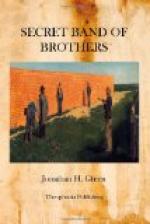J.G. FREEMAN.
First Night, from the Times.
On Monday evening, at the Lecture-room of the Chinese Museum, the debate between Mr. Green, the Reformed gambler, and Mr. J.G. Freeman of the opposite side took place, in the presence of a very large and highly respectable audience, partly composed of ladies.
Dr. Elder, at the appointed time, announced that the disputants were upon the ground, and prepared to enter into the discussion of the subject of gambling. He then introduced Mr. Freeman to the meeting.
Mr. F. said his antagonist and himself had settled the preliminaries, and in regard to the proceeds of the debates, it had been agreed that Mr. Green should receive those of the two first meetings, and that Mr. Freeman should receive the returns of the third meeting, provided, on motion, a large majority of those present were in favour of it.
He would not attempt to disguise his real feelings from his hearers, and the gratification he experienced in having the opportunity of speaking, for once in his life, to an audience composed of men of intelligence and integrity. He well knew the difficulties under which he laboured, being unused to speaking in public, and surrounded as he was in the community by the reverend gentlemen and the press, who were avowedly opposed to him, and who had thrown their bomb-shells and Congreve rockets liberally at the gambling fraternity, without mercy, but he regarded these weapons as harmless, for they had fallen at his feet without inflicting a single wound.
Mr. F. then turned to the consideration of the laws making gambling a penal offence, and particularly referred to the act of Assembly passed by the last legislature, which he denounced as unjust and impolitic. He did not appear for the purpose of defending gambling, but to speak a word in favour of those who had been represented to be the worst members of society, and against whom the voice of proscription had been raised. He contended that a man had a constitutional right to do what he pleased with that which was legally his own property, and all laws passed to abridge that right ought to receive public reprehension.
He was at a loss to understand why Mr. Green should have taken so active a part in the passage of the law at Harrisburg. It had been said that gambling must be checked, and in order to put it down, you must make it a penitentiary offence. He regarded this as an egregious error. Gambling, he was convinced, ought to be treated in the same manner as Intemperance—by moral suasion—and not by passing a law that puts a man in the penitentiary for exercising a legal right. But there were fewer gamblers than drunkards, and the former had no influence at the ballot-box.
He denied the statements of Mr. Green, that young men had been enticed to gambling-houses. They invariably went there of their own accord, and he related instances in which the relatives and friends of young men were called upon by gamblers, to exercise proper authority in restraining them from visiting such places.




